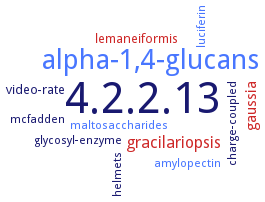4.2.2.13: exo-(1->4)-alpha-D-glucan lyase
This is an abbreviated version!
For detailed information about exo-(1->4)-alpha-D-glucan lyase, go to the full flat file.

Word Map on EC 4.2.2.13 
-
4.2.2.13
-
alpha-1,4-glucans
-
gracilariopsis
-
gaussia
-
video-rate
-
lemaneiformis
-
maltosaccharides
-
charge-coupled
-
amylopectin
-
luciferin
-
mcfadden
-
helmets
-
glycosyl-enzyme
- 4.2.2.13
- alpha-1,4-glucans
- gracilariopsis
- gaussia
-
video-rate
- lemaneiformis
- maltosaccharides
-
charge-coupled
- amylopectin
- luciferin
-
mcfadden
-
helmets
-
glycosyl-enzyme
Reaction
Synonyms
(1,4)-alpha-D-glucan exo-4-lyase (1,5-anhydro-D-fructose-forming), Ag111, alpha-(1,4)-Glucan 1,5-anhydro-D-fructose eliminase, alpha-1,4-Glucan exo-lyase, alpha-1,4-Glucan lyase, alpha-1,4-glucan lyase isozyme 1, Dehydratase, alpha-1,4-glucan, exo-(1,4)-alpha-D-glucan lyase, Exo-alpha-1,4-glucan lyase, GLase
ECTree
Advanced search results
Systematic Name
Systematic Name on EC 4.2.2.13 - exo-(1->4)-alpha-D-glucan lyase
Please wait a moment until all data is loaded. This message will disappear when all data is loaded.
(1->4)-alpha-D-glucan exo-4-lyase (1,5-anhydro-D-fructose-forming)
The enzyme catalyses the sequential degradation of (1->4)-alpha-D-glucans from the non-reducing end with the release of 1,5-anhydro-D-fructose. Thus, for an alpha-glucan containing n (1->4)-linked glucose units, the final products are 1 glucose plus (n-1) 1,5-anhydro-D-fructose. Maltose, maltosaccharides and amylose are all completely degraded. It does not degrade (1->6)-alpha-glucosidic bonds and thus the degradation of a branched glucan, such as amylopectin or glycogen, will result in the formation of 1,5-anhydro-D-fructose plus a limit dextrin. Other enzymes involved in the anhydrofructose pathway are EC 4.2.1.110 (aldos-2-ulose dehydratase), EC 4.2.1.111 (1,5-anhydro-D-fructose dehydratase) and EC 5.3.2.7 (ascopyrone tautomerase).


 results (
results ( results (
results ( top
top





